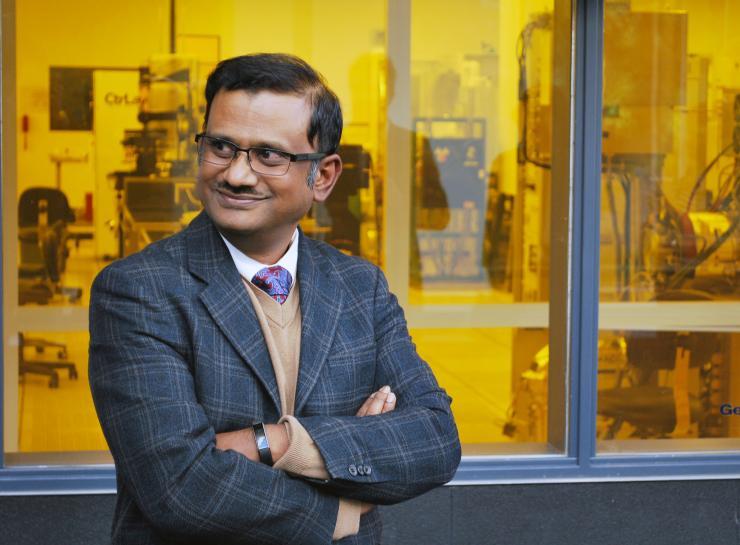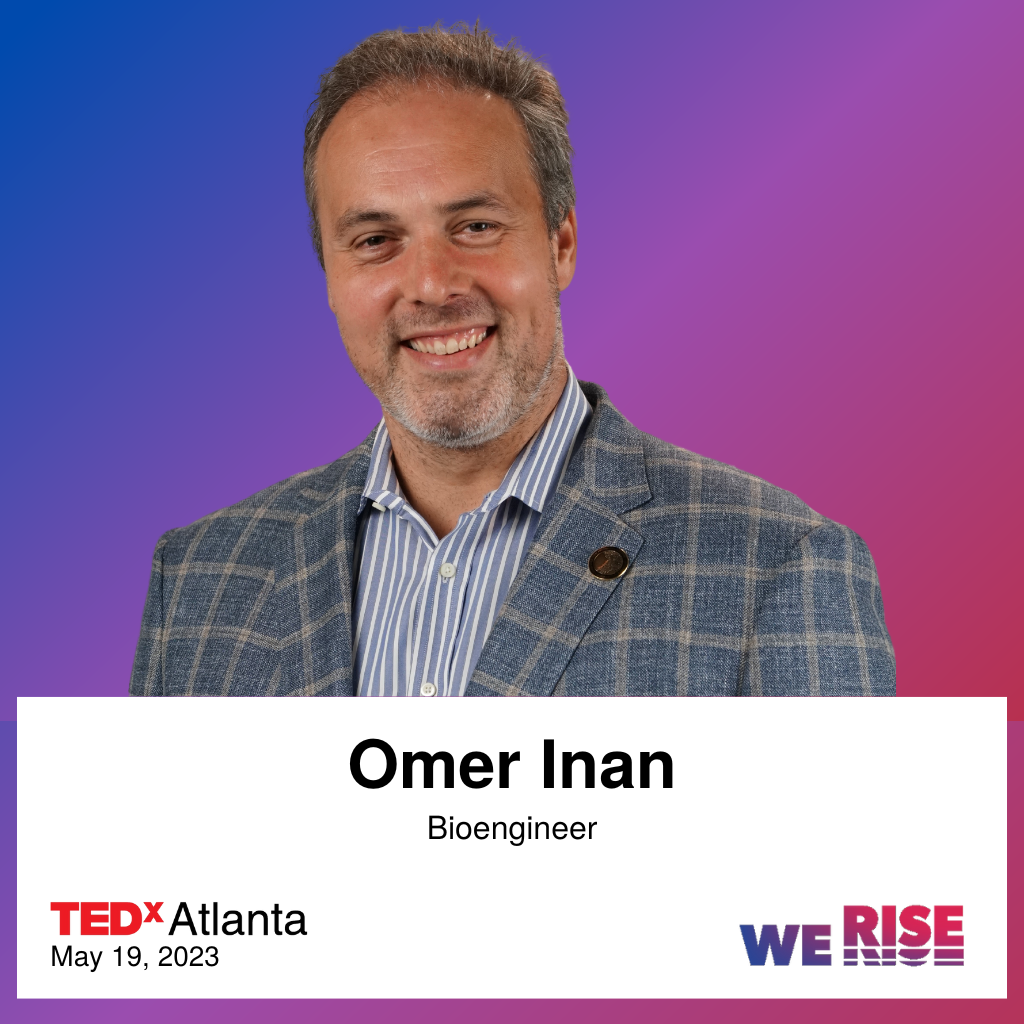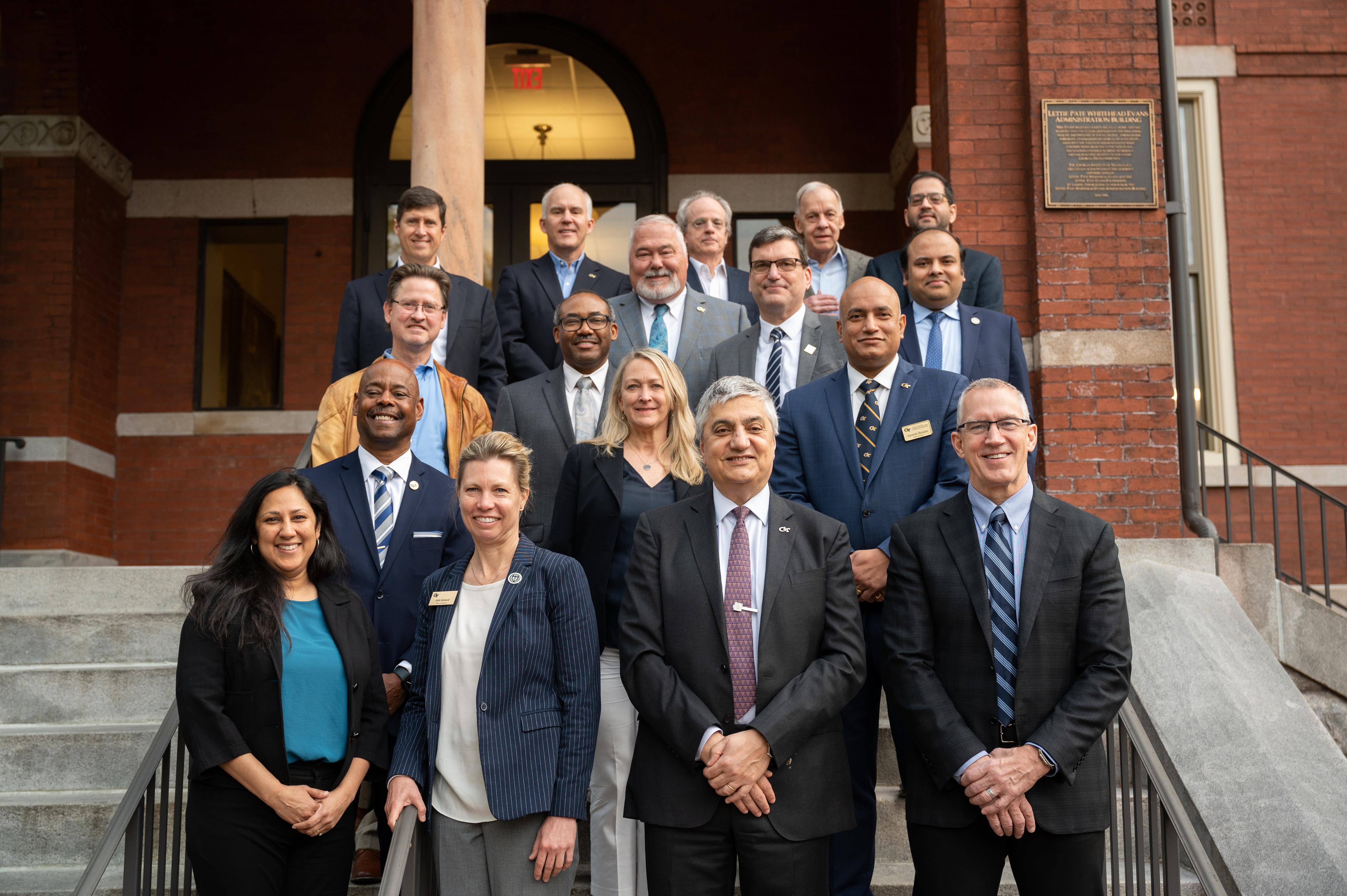NNCI Societal and Ethical Implications Webinar | NNCI Societal and Ethical Implications Webinar
Over the past few decades, state governments have found that they increasingly need more science and engineering knowledge to inform their decisions. In an effort to assist in this process, a number of states have developed fellowship programs that bring in Ph.D. scientists and engineers to work directly with state officials, lawmakers, and their staff. A number of former graduate students who participated in the NNCI’s Science Outside the Lab (SOtL) program have gone on to work with state governments to tackle complex policy problems.
BME Professor Krish Roy to Become Dean of Engineering at Vanderbilt
Apr 17, 2023 —

Krishnendu "Krish" Roy
Krishnendu “Krish” Roy, biomedical engineering professor and founding director of the NSF Engineering Research Center for Cell Manufacturing Technologies (CMaT), is leaving Georgia Tech to accept a leadership post at Vanderbilt University.
In a news story published today, Vanderbilt announced it has hired Roy as its next Bruce and Bridgitt Evans Dean of Engineering.
“It is hard to part ways with the place and people you love,” said Roy, Regents’ Professor and Robert A. Milton Endowed Chair in the Wallace H. Coulter Department of Biomedical Engineering at Georgia Tech and Emory University.
“I am excited about the incredible opportunities at Vanderbilt, but at the same time, sad to leave my Georgia Tech and CMaT family behind,” Roy added. “I am profoundly grateful for all the support I have received over the years from the administrators, faculty, staff, and students at Georgia Tech.”
A pioneer in the field of immunoengineering – particularly in the development and use of biomaterials and cellular engineering tools to solve biomedical problems – Roy came to Georgia Tech in 2013 from the University of Texas-Austin. He’ll begin his new role at Vanderbilt on August 1.
Roy also is director of the Marcus Center for Cell Characterization and Manufacturing (MC3M), Center for Immunoengineering, and a researcher in two interdisciplinary research institutes at Georgia Tech – the Petit Institute for Bioengineering and Bioscience (IBB), and the Institute for Electronics and Nanotechnology (IEN).
NNCI Innovation and Entrepreneurship Webinar | Activate Fellowships – Empowering Scientists and Engineers to Bring Their Research to Market
Founded in 2015, Activate empowers scientists to reinvent the world by launching startups to address climate change and other global challenges. Working between government, philanthropy, universities, and the private sector, Activate transforms scientists into high-impact entrepreneurs through the Activate Fellowship, a two-year immersive experience that provides funding and fosters the resources, knowledge, networks, investors, and partnerships that fellows need to succeed. Activate is a 501(c)3 nonprofit and does not charge any fee nor equity for fellows to participate.
Workshop on Materials for the Hydrogen Energy Value Chain
The Institute for Materials (IMat) and the Strategic Energy Institute (SEI) at Georgia Tech are jointly sponsoring a workshop having the objective to identify the materials research gaps, challenges and needs for hydrogen storage and transport.
Research Teams Awarded $15M to Design Materials Inspired by Deep Sea Fish and to Explore Attention Control
Apr 12, 2023 —

Randall Engle, professor in the School of Psychology; Alper Erturk, Carl Ring Family Chair and professor in the George W. Woodruff School of Mechanical Engineering; and Yuhang Hu, associate professor in the Woodruff School and the School of Chemical and Biomolecular Engineering
Two teams from Georgia Tech have been awarded a combined $15 million from the U.S. Department of Defense (DoD) for basic research projects as part of the Multidisciplinary University Research Initiative (MURI) program. MURI seeks to fund research teams with creative and diverse solutions to complex problems and is a major part of the DoD’s research portfolio.
Alper Erturk (Lead PI), Carl Ring Family Chair and professor in the George W. Woodruff School of Mechanical Engineering, and Yuhang Hu, associate professor and Woodruff Faculty Fellow in the Woodruff School and the School of Chemical and Biomolecular Engineering, were awarded $7.5 million for their project, Bio‐Inspired Material Architectures for Deep Sea (BIMADS). Randall Engle, professor in the School of Psychology, was awarded the same amount for his project titled Understanding and Building Overall Cognitive Capability Through Attention Control.
Erturk and Hu’s interdisciplinary project will explore the fundamental science behind the biological characteristics that allow deep sea fish to adapt and survive in high pressure ocean environments. They will then translate those findings to engineer bioinspired materials needed to realize the Navy’s advanced capabilities in deep sea environments.
“In the deep ocean, marine organisms have evolved to thrive in high pressure environments, and adapt to pressure changes while remaining functional,” Erturk said. “Our goal for this project is to discover, test, and translate biological mechanisms into synthetic materials and structures that can dynamically adapt to high pressures in the ocean.”
Specifically, the researchers will test and explore the origins of the biological mechanisms (both molecular and macroscopic) that underlie the ability for deep sea snailfish to adapt to high pressures, pressure changes, and pressure differentials across material interfaces. Using findings from the biological studies, the researchers will design synthetic materials and structures that will then be evaluated in high pressure chambers.
“Knowledge gained from these studies will provide insight toward the design of structures spanning from atmospheric dive suits to robotic fish for the deep ocean,” Hu said.
BIMADS brings together experts in marine biology, bioengineering, biomimetic materials, chemistry, mechanochemistry and multiphysics chemomechanical modeling, hydrogel synthesis, biohybrid material fabrication, and the design, mechanics, and dynamics of architected structures. In addition to Erturk and Hu, the team also includes Anna Balazs and Lance Davidson from the University of Pittsburgh, John Costello from Providence College, Shashank Priya from the University of Minnesota, and Andrew Sarles from the University of Tennessee.
Attention Control in Naval Training
Engle’s project will explore the brain’s mechanisms of attention control and investigate methods to potentially improve it or reduce its decline.
“We want to better understand the role that controlling attention and individual differences in that ability has in real-world, complex tasks such as flying a plane, driving a car, or even studying for a physics test,” Engle said. “We expect this work will help the Navy identify job trainees who are best able to attend to complex tasks, and also help to mitigate the effects of fatigue and mind wandering common to those tasks.”
According to Engle, the Navy trains about a thousand air traffic control professionals each year and spends over $100,000 per candidate. But nearly a quarter of candidates fail training, leading to significant financial waste.
Engle’s work with air traffic control trainees showed that current evaluations used to select candidates for training only predicts a small percentage of success. Engle found that, by using his measures of ability to control attention in evaluations, the Navy could more than double predictive success in candidate training. In addition, researchers found that Engle’s measures appeared to have less adverse impact and bias against women and minority candidates.
Engle’s collaborative research team includes researchers from MIT, the University of Chicago, Purdue University, and Michigan State University. Each team member is studying a different aspect of attention control.
Catherine Barzler, Senior Research Writer/Editor
Soft Materials and Patient-Specific Designs: Strategies for addressing complex human anatomies
Featuring Simon Dunham, Assistant Professor of Electrical Engineering in Radiology
Dalio Institute for Cardiovascular Imaging and Weill Cornell Medicine
To reserve your seat in person, visit gatech.co1.qualtrics.com/jfe/form/SV_9mGeHbgpMDt4VBs
NNCI Education Webinar | The NNCO: Supporting the NNI (That Means You)
Featuring Quinn Spadola, Deputy Director, National Nanotechnology Coordination Office
Abstract: Quinn Spadola will define the National Nanotechnology Initiative (NNI) which includes all members of the National Nanotechnology Coordinated Infrastructure (NNCI) community. She will also give an overview of the National Nanotechnology Coordination Office (NNCO) and its various duties and goals. Lastly, she will share ways you can further interact with and benefit from this federally funded resource.
Georgia Tech Chips Day
Join us for an in-depth one-day workshop at Georgia Tech, focusing on the latest research and trends in microelectronics and semiconductors. This interactive event will offer an opportunity to learn from and network with experts, academics, and professionals from across the field. The day will include:
ECE Professor Omer Inan to be Featured Speaker at TEDxAtlanta 2023: WE RISE
Apr 06, 2023 —

Professor Omer Inan is set to take the stage at the upcoming TEDxAtlanta 2023: We Rise event on May 19.
Professor Omer Inan is set to take the stage at the upcoming TEDxAtlanta 2023: We Rise event on May 19.
As the Linda J. and Mark C. Smith Chair in bioscience and bioengineering in Tech’s School of Electrical and Computer Engineering (ECE), Inan designs clinically relevant medical devices and systems and translates them from the lab to patient care applications. In his talk, Inan will be discussing his groundbreaking research on wearable healthcare technologies and the potential they hold for revolutionizing the field.
Inan is a member of the prestigious Medical and Biological Engineering (AIMBE) College of Fellows (elected in 2022) for his “outstanding contributions to the non-invasive assessment of the mechanical aspects of cardiovascular health and performance using wearable devices.” Additional achievements include an Academy Award for Technical Achievement from The Academy of Motion Picture Arts and Sciences (The Oscars, 2021), the Georgia Power Professor of Excellence for the College of Engineering (2019), and the National Science Foundation Faculty Early Career Development Program award (NSF CAREER, 2018).
TEDxAtlanta 2023: WE RISE brings together an impressive group of participants from diverse backgrounds, experiences, and perspectives. The speakers include entrepreneurs, activists, educators, artists, scientists, and many other changemakers who have risen above challenges to make a positive impact on the world.
The event's participants will share their stories and insights on how they have overcome adversity, embraced innovation, and challenged the status quo to make a difference in their communities and beyond. Through their talks, they will inspire and empower attendees to rise above their own challenges and take action towards creating a better future for all.
TEDxAtlanta 2023: WE RISE will take place on Friday, May 19 from 9 a.m. – 6:30 p.m. at the Rialto Center for the Arts (80 Forsyth Street Northwest Atlanta, GA 30303). Learn more and purchase tickets at tedxatlanta.com.
Dan Watson
Georgia Tech and GlobalFoundries to Collaborate on Joint Semiconductor Research and Workforce Development
Mar 31, 2023 —

Georgia Institute of Technology, one of the top public research universities in the U.S., and GlobalFoundries (Nasdaq: GFS) (GF), one of the world's leading semiconductor manufacturers, today announced a new partnership to expand collaboration on semiconductor research, education, talent, and workforce development.
By jointly creating and implementing new educational, engagement, and research opportunities for students and faculty, Georgia Tech and GF are advancing semiconductor innovation, while helping prepare and train a new generation of talented young people for careers in the semiconductor industry. The new partnership includes collaborating on proposals for support from the U.S. government through the CHIPS and Science Act funding.
“Semiconductor research is a top priority for Georgia Tech and the nation, as we develop innovative solutions that improve manufacturing and support our national and state economies,” said Chaouki Abdallah, executive vice president for Research at Georgia Tech. “Deepening our partnership with GlobalFoundries allows us to leverage our complementary technology and talent resources to benefit this vital industry, and to improve the human condition.”
"At GF, we recognize the tremendous potential of semiconductors to drive innovation, and ultimately enable the inventions and technologies that create meaningful societal change,” said Gregg Bartlett, chief technology officer of GF. “By partnering with top-tier universities like Georgia Tech on research and development, we can tap into a deep pool of academic talent and technical expertise and bring new ideas and insights to the forefront of our work. Through this collaboration, we aim to push the boundaries of what is possible in feature-rich semiconductor technology, as well as inspire students to pursue a career in the exciting field of chip design and manufacturing."
The strategic agreement outlines a framework of collaboration between GF and Georgia Tech to expand research and development opportunities on GF semiconductor technology, curriculum development, training programs, internships, and joint faculty/engineering exchanges. Additionally, the agreement calls for Georgia Tech and GF to partner on outreach to inspire interest in semiconductors and highlight career opportunities in microelectronics. GF and Georgia Tech will also explore programs to enhance diversity and inclusion within the semiconductor workforce.
For GF, the partnership with Georgia Tech will be overseen by GF Labs, which leads the company's research and development efforts to advance GF's differentiated technology portfolio in partnership with leading academic, government, and industry collaborators.
About Georgia Tech
The Georgia Institute of Technology, or Georgia Tech, is one of the top public research universities in the U.S., developing leaders who advance technology and improve the human condition. The Institute offers business, computing, design, engineering, liberal arts, and sciences degrees. Its more than 46,000 students, representing 50 states and more than 150 countries, study at the main campus in Atlanta, at campuses in France and China, and through distance and online learning. As a leading technological university, Georgia Tech is an engine of economic development for Georgia, the Southeast, and the nation, conducting more than $1 billion in research annually for government, industry, and society.
About GF
GlobalFoundries (GF) is one of the world's leading semiconductor manufacturers. GF is redefining innovation and semiconductor manufacturing by developing and delivering feature-rich process technology solutions that provide leadership performance in pervasive high growth markets. GF offers a unique mix of design, development and fabrication services. With a talented and diverse workforce and an at-scale manufacturing footprint spanning the U.S., Europe and Asia, GF is a trusted technology source to its worldwide customers. For more information, visit www.gf.com.
©GlobalFoundries Inc., GF, GlobalFoundries, the GF logos and other GF marks are trademarks of GlobalFoundries Inc. Or its subsidiaries. All other trademarks are the property of their respective owners.
Forward-looking Information
This news release may contain forward-looking statements, which involve risks and uncertainties. Readers are cautioned not to place undue reliance on any of these forward-looking statements. These forward-looking statements speak only as of the date hereof. GF undertakes no obligation to update any of these forward-looking statements to reflect events or circumstances after the date of this news release or to reflect actual outcomes, unless require by law.
Georgia Parmelee
georgia.parmelee@gatech.edu
